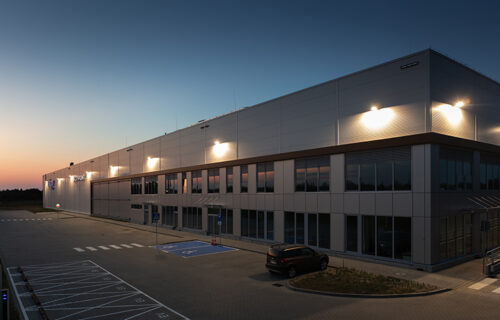City Point Okęcie, a logistics and office complex developed by Peakside Capital near Warsaw’s airport, has become the first building in Poland to use Ruukki® LowCarbon sandwich panels, a new generation of construction materials designed to reduce carbon emissions. The project was delivered in cooperation with Ruukki Polska and Depenbrock Polska, which managed the installation of the cladding system.
The panels were manufactured at Ruukki’s Oborniki plant using SSAB Zero™ steel, produced entirely from recycled scrap and processed with renewable biogas and fossil-free electricity. According to the manufacturer, this method lowers the carbon footprint of the panels by around 42% compared to conventional products, a claim verified by environmental product declarations (EPD).
The 11,000-square-metre City Point Okęcie development is a build-to-suit logistics and office facility designed to meet high environmental standards. It incorporates energy-efficient materials, modern building management systems, and prefabricated structural components. “Delivering a project of this scale requires precision from design through completion,” said Marcin Popek, Project Manager at Depenbrock Polska. “The technologies used ensure both operational efficiency and sustainability.”
Ruukki’s regional director for Central and Eastern Europe, Waldemar Szostak, described the initiative as a model for future industrial construction. “The use of low-carbon materials represents a major step toward sustainable building. It reflects a shift in the industry toward considering the entire life cycle of materials and structures,” he said.
Peakside Capital has incorporated sustainability principles throughout the investment, aligning the project with EU Taxonomy requirements and aiming for BREEAM and LEED certification. The company emphasised that the partnership with Ruukki supports its broader environmental goals. “Using panels made from fully recycled steel with a reduced carbon footprint is consistent with our commitment to circular economy principles,” noted Katarzyna Krześniak, ESG Project Manager at Peakside Capital. “Their lighter colour also helps limit heat absorption, improving energy efficiency and extending the lifespan of the building’s façade.”
City Point Okęcie’s completion marks another step in Poland’s shift toward lower-emission construction methods. As more developers integrate renewable materials and energy-saving technologies, the project serves as a case study in how industrial buildings can meet both operational and environmental performance goals.
